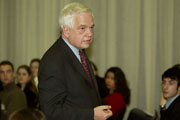
Minister of national defence
John McCallun speaks to students at Concordia
Photo
by Andrew Dobrowolskyj
|
by James Stairs
John McCallum, Canada’s minister of national defence, says our nation’s
military, while facing new challenges, remains committed to the principles
which make it respected worldwide. However, it must be given the financial
resources to do its job effectively.
As a small group of anti-war protesters who braved the bitterly cold evening
banged loudly on the front windows of the Bronfman House where the minister
was giving his address, McCallum tried his best to articulate his department’s
policy to a largely skeptical audience.
He was giving the opening address to the 80 delegates attending the Canadian
Political Science Students Association annual conference, held at Concordia
University on Jan. 17-19.
“Our goals are now, as they have always been, to defend Canada, defend
North America and to contribute to democracy overseas,” he said.
The conference, titled Canadian Defence Policy in the 21st Century, brought
political science students from across the country together for four days
at Concordia to discuss issues surrounding the Canadian military and how
its resources are managed.
McCallum, whose address changed venues at the last minute because of
the anticipation of a larger protest, suggested that when the Cold War
ended in the early 1990s, many people believed that Canada’s military
commitment would be diminished. This, he argues, is not true. “Since
1990, Canadian deployment has gone up. Free of communism, the world has
actually become more dangerous.”
Canadians have told him repeatedly that they want peace and recognize
that a strong military can contribute to domestic security.
With new threats posed by terrorism, military policy must be altered to
adapt to this new climate.
“We need to work on the development of infrastructures,” he
urged. He suggested that Canada’s soldiers will work with local emergency
organizations, training them how to better respond in the event of a chemical
or biological terrorist attack.
McCallum also told delegates that further co-operation with the United
States regarding the sharing of information and resources is necessary
to defend North American borders. The goal, he said, was to provide homeland
protection by having the two nations “work effectively together.”
Another part of the domestic role of Canada’s military, McCallum
said, is disaster relief and community support. He cited the 1998 ice
storm in Quebec Ontario as well as the floods in Manitoba as examples
of how the army can help citizens in times of crisis.
Defence spending has to increase, he argued, in order for the military
to effectively perform its function. “With what we have, we do well,
but in terms of spending on the military, we are sixth in NATO and 14th
in the world. Canada needs more money for equipment. We don’t have
to double the budget, but a 10-per-cent increase is realistic.”
McCallum suggested that a restructuring of defence department spending
priorities could provide the needed financing. “I’m an economist;
I know about allocation and consolidation,” he laughed, referring
to his previous careers as both an economist and as the CEO of the Royal
Bank.
Reserving the final part of his speech to articulate Canada’s position
regarding involvement in disputes outside of North America, McCallum said
clearly that “Canada supports the United Nations.”
Referring to Iraq, McCallum said that if the UN feels multilateral intervention
is necessary, then Canada would participate because “it is our duty”
to do so.
When aggressively questioned by a number of delegates as to whether Canada
would support a United States invasion of Iraq that was not sanctioned
by the UN, McCallum refused to speculate, stating simply that Canada had
never “acted in a military manner without broad international consensus.”
McCallum described the government of North Korea’s statement that
it would resume testing nuclear weapons as “a big problem.”
Resisting any comparison with the dispute in Iraq, he explained that North
Korea’s proximity to neighboring South Korea makes any military intervention
“extremely risky.” Diplomacy, he said, was the wisest course
of action in this case and that “Canada is not a major player when
it comes to North Korea.”
Prime Minister Jean Chrétien has the last say, according to McCallum,
whenever Canada engages in military activity. He did note that “Canada
is committed to a peaceful resolution” regarding any possible military
exercise, “but would not hesitate to do its duty and join the mission”
if it were called upon to do so.
After the speech, delegates seemed bewildered about the emphasis of McCallum’s
address. “I was expecting more of an aggressive speech,” Barbara
Mauro, a Concordia political science graduate said. “I understood
his position, but he didn’t seem like he was really in control of
the policy he was presenting.
“He really came off as an academic, not as someone who is leading
our military forces. I found it surprising.”
|
|
|



